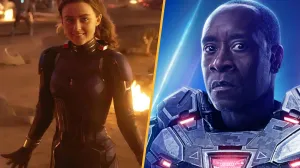The first issue of SFSX debuts today, bringing a new unique and incredibly personal dystopian story to the Image Comics catalog. The series crafts a world that often doesn’t feel far from reality, in which sexuality is bureaucratized and criminalized by a conservative group called The Party. At the center of the story is Avory, a bisexual sex worker whose relationship to both sides of society – the draconian world brought on by The Party, and the queer underground community called The Dirty Mind – gets turned upside down.
Videos by ComicBook.com
The narrative of SFSX comes courtesy of Tina Horn, a writer and educator on sex culture who also hosts the popular podcast Why Are People Into That?!. With the first issue already heading to a second printing, it’s clear that readers are eager to see what Horn and SFSX have to offer. Ahead of the series’ launch, ComicBook.com recently got to chat with Horn via e-mail about the first two issues of SFSX. Read on for a (spoiler-free) discussion on how Horn’s experience factored into writing the series, what tropes she set out to avoid, and what’s in store for the series’ future.

***
ComicBook.com: To start, I was wondering if you could describe SFSX for our readers, and what exactly inspired you to come up with the story.
Tina Horn: SFSX is a dystopia about American sex and gender politics. In the world of the series, citizens must navigate a bureaucratic nightmare to report the details of their sex lives to the government, leaving little room for fun, glamour, experimentation, or deviance from the norm. It’s inspired by my work as a journalist covering the sex worker rights movement and queer kinky cultures. I wanted to dramatize what it’s like to have an identity that’s surveilled and policed by those in power. I’m also sick of not seeing myself and my communities represented in the comic book genres I love so much, like sci-fi, horror, romance, and thrillers, so I wanted to put our struggles and joys at the center of the story.
Your resume is perfectly suited for a book like this, but was there any additional research or preparation that went into telling the story? If so, was there anything that surprised you along the way?
The content of the book, the style and the politics and the characters were very much drawn from my personal life and my nonfiction work. My biggest learning curve was learning how to transform all that into entertaining fiction! I had to learn how to build suspense, fully realized technologies, and relatable emotional arcs. And because engrossing stories are about conflict and hardship, I had to learn how to create characters I love and put them through horrible, horrible ordeals!
What has it been like making the transition from nonfiction and articles to the world of comics? Were there any challenges or upsides that you didn’t expect?
Because I’m a cultural critic that’s very invested in marginalized communities, I knew there were some tropes that I wanted to avoid. “Bury your gays” is a perfect example. Queer characters are punished far too often in movies, tv, and comics. Then again, I had to learn not to be too precious with my characters. Because if you create a genuinely diverse cast, and you’re writing an action-adventure, people have to be mutilated, and fail, and behave badly, and die! That’s what gives the genre tension! So I had to figure out how to put the characters through pain without subjecting them to the same boring stereotypes that I’ve critiqued in my nonfiction work!
I really loved Avory as a character, and the way that information about her past and her relationship with other characters is revealed in layers. What made Avory feel like the perfect protagonist to be at the center of this story?
Avory has a little bit of me, and also synthesizes a lot of queer sex workers I know, especially those of us who are getting into our 30s and starting to feel tired of fighting all the time. I know it might seem odd to put a queer woman at the center of a story and have her central romance be with a man. But the story I want to tell is about the cost of safety. So I wanted Avory and her husband George, who is also queer and kinky, to be faced with the opportunity to choose passing privilege. They’ve chosen conformity and it’s clear from Issue 1 that it’s not making them happy. Or safer. The Big Bads of SFSX are Mrs. Boreman and Dr. Powell, and the monolith of the Party, but it’s not a mistake that at first, Avory’s foils are her friends that she abandoned in order to be safe. The Dirty Mind is understandably pissed off at her, and their feelings and experiences will become more central as the story progresses.
Even as dystopian fiction, there’s definitely a sense that SfSx isn’t too far off from our current reality. What do you hope people take away from the series’ political undertones?
Yeah, SFSX is meant to be the kind of dystopia where the absurdity is turned up juuust enough that you realize: this could be you! What I hope is that readers realize it’s already this bad for queers, sex workers, sluts, and anyone whose gender or sexuality is transgressive in America. We already feel bureaucratized out of existence. And we’re already fighting for our rights to survive and thrive.
I really resonated with the way that the first two issues represented bisexuality. It often feels like comics on this scale either confirm a character is queer in a one-off line and never reference it again, or make their coming out a massive event, whereas SFSX quickly makes it just a fact of life. I was wondering if you could speak about that decision and the significance of it within mainstream comics.
I’m really happy to hear you say that! Bisexuality, in particular, is a queer theme of this book. I hope this feels to others like a story that hasn’t been told enough: what happens to that identity when you have passing privilege. I would argue Avory and George aren’t handling it very well, and they’re learning that the hard way.
I was very mindful that, as a queer bisexual cis woman, I wanted to make a queer story populated with a multitude of queer characters and a queer aesthetic sensibility. There are other queer romantic and sexuality relationships that figure more centrally as the story progresses: like queer dykes Sylvia and Jones, as well as two trans characters who start to fall for each other.
Is there a sequence or scene in the issues thus far that you’re especially proud of?
Definitely an escape sequence in Issue 1 that has a mutilating attack I’m very proud of: I’m hoping to go in the pantheon of all-time great high heel as weapon scenes! I think it shows how much I’ve learned about pacing and choreographing action. I’ve worked with editors who have taught me a great deal about that. Working with Michael Dowling to stage a propulsive, scary, visceral chase taught me so much on how to keep comics exciting.
What are you most excited to see readers respond to with SFSX?
We’ve already been meme’d, and I can’t wait to see us get cosplayed! I hope readers learn to see kink and sex work as a theme of community, culture, and friendship. And for those who already experience leather and BDSM that way, I hope it’s a breath of fresh air.
What can you tease about where SFSX will go next?
There are some wonderful queer artists coming on board later in this arc! For the next arc, I really hope to make a big bad who is an incel or MRA, and use fiction to explore the horrors of those ideologies. And I want to have more moments of joy and pleasure for their own sake. I like quiet moments in stories, where characters fuck and sleep and talk and eat. I think there’s room for more of that in action-adventure. When I’m reading action comics I’m always screaming: “Drink some water and take an orgasm break ya’ll, you’ll fight better!”
***
SFSX #1 is now available in stores. Issue #2 will be released on October 30th.








